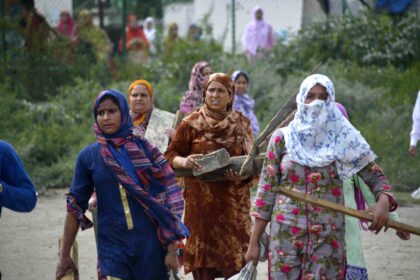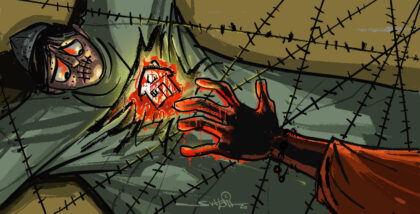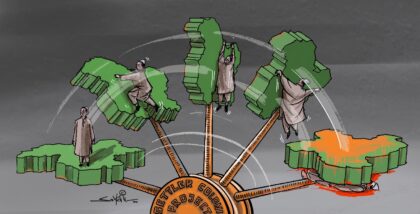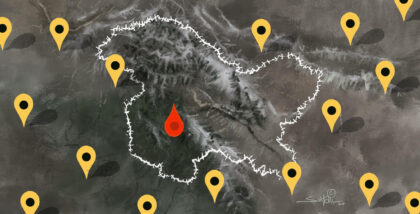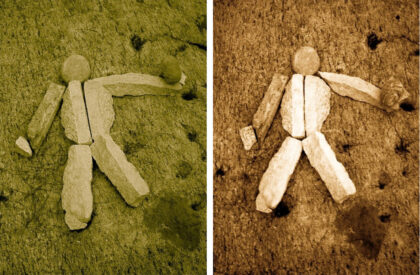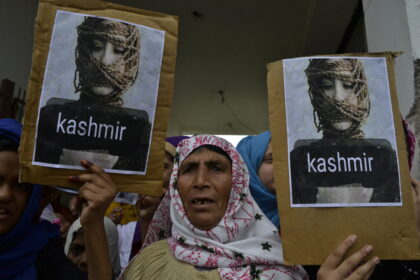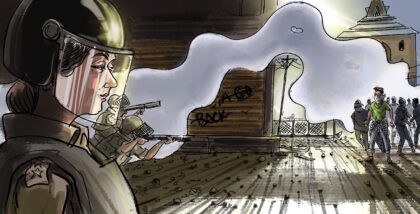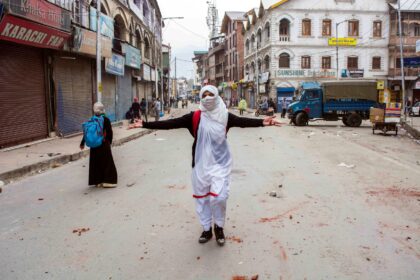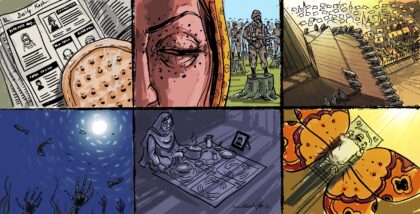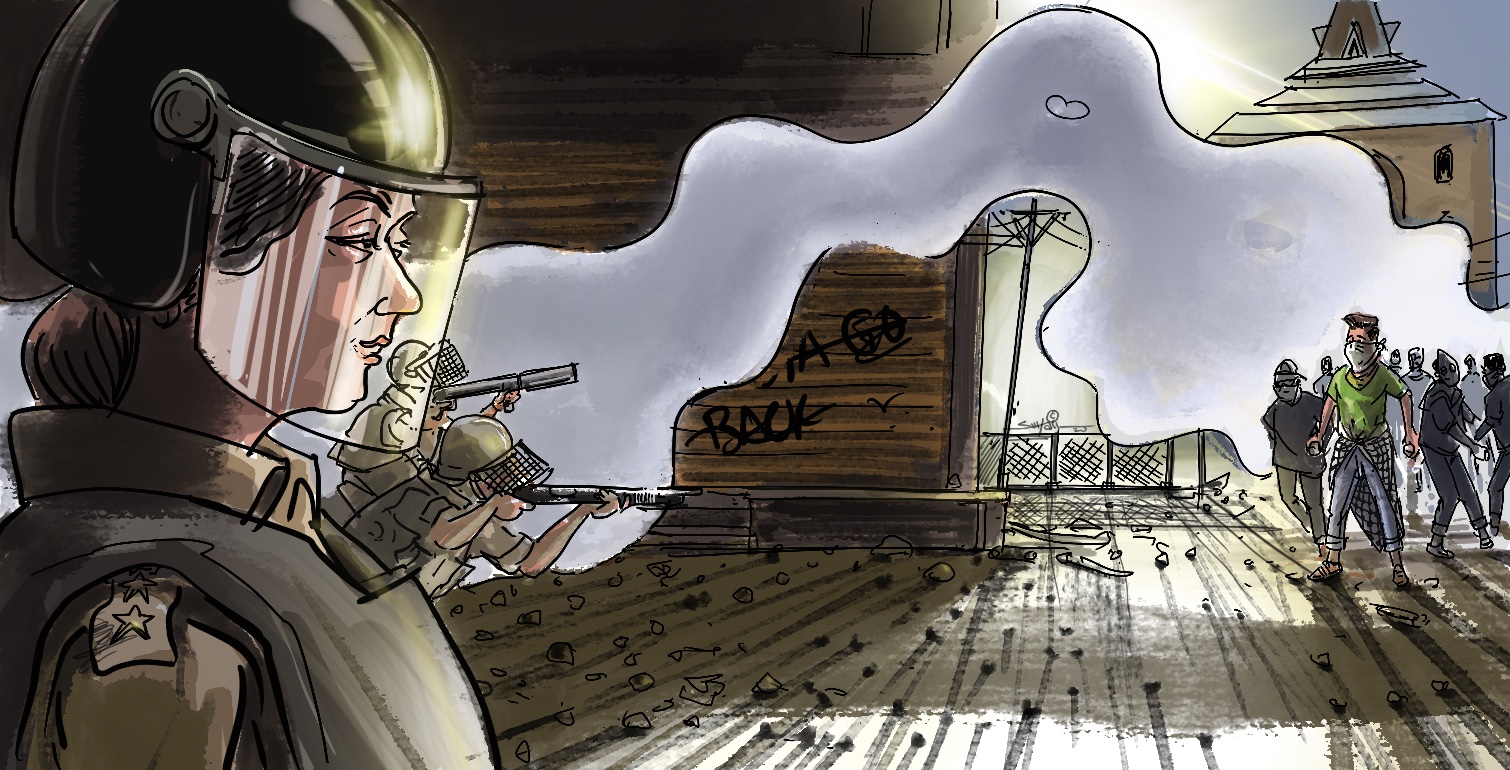 Illustration by Suhail Naqshbandi.
Illustration by Suhail Naqshbandi.
She looked at him through the polycarbonate visor. He watched her in the mist of the gas. Anytime now he’ll break into tears and she’ll think him weak. Anytime now she’ll lead the charge so that he doesn’t think her lacking in courage.
*
This wasn’t the first time they were face to face. She had seen him, touched him, when he was brought in earlier in the year, but it was now, during a hiatus in the maelstrom of stones hurled with both fury and precision by the boys, that she found confirmation there might be feelings for him. In the spring, he’d been let go the next morning, as the site could host only a limited number and they chose to detain those thought to be hardcore. She’d spoken to him like the others and when he refused to raise his head, grabbed his hair. “Are you scared, ashamed, or is it beneath you to look me in the eye?” It was the wide smile that had thrown her off, enraged her momentarily. “I am just shy, Madam,” he’d said, looking up at last.
*
As the stone shower resumed, she gritted her teeth and walked on quickly, her men keeping pace in a synchronized squadron around her. They wore leg guards, knee-caps, steel-mesh masks and tear-gas-proof visors, helmets as if borrowed from Lucasfilm, and Kevlar jackets. But he disappeared once again, as though by magic. Ever since she took charge of the site in this part of town, this had fascinated her and the men she reported to in the capitol. One minute he’s standing there, ready to throw or having thrown a high-speed projectile at the soldiers, and the next he’s gone, disappeared. How does he do it? After each vanishing act, she’d vow to find out the next time he was arrested.
She now raised her steel-tipped baton and held for 30 seconds or so. Her job as commanding officer in one of the most defiant and volatile boroughs of the city was clear cut: Keep the protests in check. Do not let them transform into something bigger. Do whatever it takes. Try not to kill too many.
The stocky, lean, pot-bellied, young, and middle-aged men, almost all of whom had touched her body in their hours of sleeplessness, came to a halt. She knew some of them not by their names but by the epithets she’d given them according to the body part they ogled most. At first, it used to make her look up and down in discomfort and anger, the burning sense of ten, fifteen pairs of eyes on her breasts and hips, but soon, she decided to not care, and, perhaps more satisfyingly, to torment some of the men, the older ones in particular. Once, towards the end of her third month in the role, she loosened two top buttons on her shirt and fiddled with the third, to watch the senior-most man on her retinue look hither and thither, unable as he was to fully disengage his eyes from her chest. She’d watched him stare at her from the first day and decided he was the perv-in-chief in these parts. Do men get dirtier as they grow older? Was she, in fact, witnessing a waned, late-middle-aged version in this man, or are men simply born this way, congenitally perverted, she’d wondered then?
*
He came back, with a few handkerchiefs wrapped in different formations round his neck and forehead. A sprawling keffiyeh, tied around his waist for some reason, gave him the appearance of a large bird that had decided to walk. She thought he looked like a mobile hanky kiosk. What she didn’t know was that the handkerchiefs hid children’s swimming goggles, which, because they fitted tightly over the eyes, allowed the boys to continue working amidst the gas sprays.
Behind him, four boys carried a winnow, full to the brim with discoid and craggy stones. Quietly, he helped them put the stone-ship down just behind the mouth of the lane and hurled three large pebbles towards her entourage in one go. She knew or thought she knew that he had carefully thrown the stones further from her but not too far away. One of the flat stones lodged in the mouthpiece of the mask worn by her frontman, who marched on unfazed, a frozen stone tongue poking out of his face.
By now he was already at the back of the relay team that stretched deep into the winding lanes, one of which led to a small yard where three old women and ten girls broke bricks and rocks into hand-ready projectiles. One boy at a time swung forward, taking a rapid-fire turn to pick and throw from the winnowing basket. Having negotiated the labyrinths of the old town from the time they learned to walk, the boys knew that speed and mobility were essential attributes of a potent frontline stone warrior.
She now waited. Today is the day, she said to herself.
*
Madam made her name within a year of her posting. At first, she’d appeared hesitant, sometimes even afraid, to walk out with her band of men. As a lady officer, she wasn’t exactly looked down upon by the men; they just felt they needed to protect her. It was the right thing to do, she is a woman in a man’s job, after all, some of them would tell their wives at night. It didn’t matter that she had three gold stars on her shoulders and most of them had none. Madam was, of course, aware of these expectations from the men, and she chose to live up to them, especially when it came to “going out there” to deal with the stone fighters. Her men believed Madam must be frightened and Madam duly obliged. This allowed her time to size up everyone in the team, and by the end of the third month, she had separated the “gross ones” from the gents, the talk-shops from the genuine articles, the shirkers from the professionals. Equally, it gave her time to find her feet, to get a feel of the temperature, and to gradually own her surroundings. It was only then that she decided to assert her authority. “Gentlemen, from now on, you will call me Madam, not by my first name, not by my surname, just M a d a m,” she had said, concluding the evening debrief one summer day.
The white van always followed last. None of the boys knew what it contained.
Now she felt she was secure in the role and sometimes pursued her tasks with a fervor and ferocity she hadn’t thought she possessed. She liked chasing the boys and sometimes went deep inside their territory in the old town, often with a cocked handgun in her hand. If they are the resistance, she joked to herself one night, I am persistence. Every time there was what was known in official circles as unrest—which, in essence, was just a ritual reminder on part of the boys that the soldiers weren’t welcome—her men would wait in two rows outside the gate and as soon as she was in the middle of the man-chain, converge around her like locusts. Then they would march machine-like towards the trouble-spot, which most often was the town square. Riflemen first, the tear-gas three in the second tier, the Sub four on the outer flanks, and the automatics at the back. The white van always followed last. None of the boys knew what it contained.
Soon after the end of her probation period, Madam decided to set some ground rules—before the men became too protective of her. When one of the senior soldiers put his hands on her breasts during a melee caused by tear-gas shells the boys had hurled back into the square within seconds, she didn’t say anything. Later, as they sat down for a debrief in the meeting hall, she said to him, “Come, sit with me, sir…” He ran a glance over his colleagues and strutted towards her but as he sat down, she slipped her ultra-compact SIG P210 (that she seldom used) between his legs, brushing his groin with the muzzle. “The next time you want to save me and my breasts from the tear gas, please do spare a thought or two if you will, for your precious stones.”
*
As she waited for him to come back, she wondered if he knew, and if yes, how much. During their first encounter, he’d averted his gaze, but later that day she’d caught him stealing glances at her. The second time they met, he’d looked at her in defiance and told her that while the boys respected her as a woman, no concessions would be made on that account.
“What about you?” she’d asked, moving a few inches closer.
“I’m one of them, Madam. You do your job, we do ours.”
“And what is your job?” She’d tapped his shoulder with her fingers, he remembered.
“You know it very well, Madam. We’d like you to leave and never come back.”
She wondered now if it was then she realized he was considerably younger than her. Later that evening, he’d startled her with a question. “Can I ask you something, Madam? What posters did you have in your room when you were growing up, whose posters…you know what I mean?”
During those long hours in the cell, when sometimes detained for a night or two, he struggled to keep her from his mind; he rebuked himself for thinking about the way she’d put her hand on his shoulder.
“Steffi Graf, I had Steffi Graf on the wall,” she’d said without thinking. Then, perhaps realizing she might have come across as a bit too keen to talk to him, she added, “everyone I knew had her posters, so yeah…”
“Well, I didn’t let Andre Agassi come into my room. But I once put up a film poster, Omar Mukhtar, the Lion of the Desert, on my door! Ever heard of him?”
“I have… As a matter of fact, I know of the film, although I wouldn’t make him my poster boy. You must have been studious at school. Were you? Or just pretentious?”
“Oh, so now you know everything about me: my schooling, my nature, my DNA, just because… Please!”
*
Perhaps he isn’t too young after all, she thought, remembering their short exchanges at the detention centre. Respect, resistance, defiance. These were words he used often. She’d also heard him speak when he came to visit his detained friends. Nearly all the men who worked with her—for her, really, even if most didn’t give it serious thought—had insisted that he shouldn’t be allowed to visit, because it was a privilege extended only to parents or siblings, one at a time. But she’d put her foot down. “It’s better to give him something to chew on, keep him close. And I know how to fix him if he gets out of control. Let’s see how long he can resist.”
At night in bed, she schemed how best to turn him, if he could be turned at all, that is. Of course, he can be turned. Everyone breaks at some point. But how? I can’t come down too hard on him. Can I?
*
He often took his smoke break with the other smokers in the group, which was nearly all of them, usually after an intense bout of stone-throwing, but these days, he preferred to go into a back lane and lean against an electricity pylon, exhaling through his hair. No concessions, he told himself between quick drags. No concessions whatsoever! It was a clever move to send her here, but I can see right through their cunning. There are some among us who’ll not hurt a woman under any circumstances, which is perfectly fine, as it should be, and some others who lose their bearings the moment they set eyes on an attractive woman, but not me. Not me. Respect and all that is fine, but man or woman, plain looking or pretty, the enemy is the enemy. She’s nice to me, I know, I know, but there won’t be any concessions. He remembered he’d felt a tiny bit tremulous when she touched him during his second visit to the site. Looking down hadn’t helped, had made it worse probably, as his eyes first fell on her belt and the slight rise of her belly above it, then quickly shifted down towards her legs, at last resting on her shoes. When she put her hands on him the first time, he thought she might be about to hit him. Instead, he found himself taking in the scent of her soap or deodorant or perfume—whatever it was, it had a disorienting effect on him.
Ah, his face lit up now, if at all it was true, if indeed she was kind of soft on him, might it not present an opportunity? They sent her here to ensnare some of us. But what if the opposite was possible? And what if I told her about Mummy?
He flicked away his cigarette and stood up to join the brigade on the frontlines. The winnow was full again. He plucked a rough stone the size and shape of a pear, took aim quickly, and threw with a flat arm.
*
The stones kept coming at the troops like starved birds swooping down on strewn grains. She raised a fist to signal to the tear-gas men to remain ready. During her first few weeks in the town, they’d fired dozens of canisters without waiting for her order. At first, she had gently suggested that it was perhaps a good idea to speak with their boss before filling the square with gas clouds, just so they could go back to the site for lunch. They’d smiled, indicating agreement, but the next week, two of the men went for the trigger at the first glimpse of rocks in the sky. That evening, she handed both hand-written suspension notices—only for a week, she made sure—and asked two fresh recruits to take their place on the team.
It was one of the hubs of the resistance, after all, and it didn’t take too long for boys to turn into men, into leaders.
By now she’d learned that a horizontal trajectory of an incoming stone was sometimes a prelude to an all-out assault—the stones would fly in from improbable directions and unexpected places. It meant that the boys were angrier than usual, were under instructions to escalate, or were creating a distraction for some other purpose. What had upset him in this way, she wondered, as he reappeared in a blur of sleeves and kerchiefs at the front of the lane that led to the fishmongers’ street? She couldn’t even steady her hand, let alone shoot if the need arose, in the time he came, flung a stone, and disappeared in the labyrinths. What am I to do with him? I hope I don’t end up beating him up some day. Or perhaps that’s exactly what I should do when we nab him the next time. The arrogant, impudent…proud…boy! He probably thinks he’s some sort of Batman; I cannot believe he’s gotten on my nerves.
It was at moments like this that she doubted her decision to let him go in the spring. “It’s not advisable to turn the boy into a hero,” she had written, as explanation, to her immediate boss in the capitol. It was one of the hubs of the resistance, after all, and it didn’t take too long for boys to turn into men, into leaders. But was he, in fact, already a leader who had chosen to keep a low profile, deliberately adopting that soft manner with her when he was brought in? Had she been had? He possessed everything required of a leader in these parts. He was clever, he was fearless, he used his height to great advantage when the soldiers gave chase. He had great hair. Yes, he was younger than some of the other kids, but they all seemed to defer to him. Maybe he is hardcore, after all, and I’m just wasting my time. No concessions from now on. Absolutely none.
*
The pear-shaped stone hit one of the carbine-wielding soldiers on the hip. He let out a scream and crumbled down. Some of his colleagues gathered around him in a ring. A torrent of stones came down on them instantly. The men raised their shields above them, covering themselves and the injured man. She was ahead of them, her eyes alert, searching for a glimpse of him. She called out to the few men in front of her and mouthed instructions. They broke rank and turned towards the injured man, gathering around the men with the shields. After a few grunts and hmms that men suddenly produce when faced with hesitation, some of them started to wave handkerchiefs and some others tissue paper because they knew their hankies weren’t white. At first, the boys didn’t know what to do. They looked towards him, but he didn’t respond. She looked at him too, and, after a pause, gestured towards the napkin peaceniks. He looked back at her but did nothing to halt the stones. When he saw that there was no retaliation from her or any of her soldiers, he put two fingers in his mouth and produced a high-pitched whistle. Just once. The rain of pebbles stopped.
She acknowledged the ceasefire with half a smile. He slashed the air with his hands, indicating it was only temporary, momentary. She nodded. He nodded back. Her men started to move the compromised man on a stretcher. She followed behind at an easy pace.
*
One of the frontline throwers, an 18-year-old boy known among his friends as Spear, whose mother was killed in the massacre of teachers when he was 11, touched his shoulder and pointed towards the white van near the cordon of soldiers. He shrugged, then paused for a moment to look back at the face of the boy who had refused to let go of his mother’s body until the last pulse of strength in his body was exhausted. His father, grandfather, and the elders of the clan had to carefully disentangle his hand from the knots of the shroud through which he had somehow slipped his slender wrist.
There was method, madness and manner to the art of resistance.
As soon as the wounded soldier was removed—or retired injured, as one of the boys put it during the hiatus—each side waited for the other to restart hostilities. Sometimes, when the soldiers got tired of the waiting game, they themselves threw stones and marbles to resume normal business or to target a protestor they knew had hurt or was capable of hurting them. Madam had noticed this soon after her arrival, had tried to dissuade her men from doing so, but quickly realized this was beyond her powers. It was a part of the game. She began to understand there were rules and rhythms to these clashes. There was method, madness and manner to the art of resistance. There was an ethic to the act of stone-throwing and there were stages to the system designed to quell it. Both sets of rules were sometimes followed and sometimes not. While the boys employed a combination of stealth, speed, and ferocity, the soldiers focused on making sure they captured enough youngsters to keep the revolving door of punishments and inducements well-oiled and running. Of course, they knew they could resort to bullets anytime they wanted.
There were also some unwritten codes of combat. She once noticed a young stone-thrower sharing his water flask with an older soldier who, in a moment of rage, had come too far into enemy territory. As soon as he had quenched his thirst, the adversaries ran back to their respective battle lines. On another occasion, she’d overheard a senior trooper asking a colleague to soften the blows of his rifle butt on a reedy boy they’d cornered near a dead end. It was the same boy who had the previous week ceased fire as his opponent knelt to pick up his glasses. Sometimes, the craving to wound the other was tempered by moments of kindness, sometimes merely punctuated. Madam once saw one of her two close aides land countless blows on a teenager’s behind, so many, so severe, that the boy was unable to sit down for two months. For her, it wasn’t just an education in the modes of street conflict but also in the peculiar ways of boys and men, which she increasingly found to be a bigger cause for despair than anything else in the world. Clearly, she thought, it was a man who had decreed that men should run the world. All this was, of course, not helped by the oppressive smell of unwashed men in the meeting hall at least twice a day. The odor would rise and rise and feel like an assault on her very being, as if clouds of filth were smothering her. At these times she had no choice but to distract herself by thinking of him, how he, his breath, smelled.
*
As she walked back into the fray, Madam’s eyes glimmered with hope. What do they say? Everything is fair in love and war, huh. She couldn’t help smiling at her ingenuity.
This time the stones flew in like hordes of swallows from behind the houses. The soldiers, tracking their arcs over the roofs, responded with a flurry of marbles shot from purpose-built catapults. The blue and grey balls of glass zoomed through many of the incoming stones, shattering and breaking in mid-air collisions. Shards of stone and glass flew into balconies, broke windows, entered chimney holes, lodged in washing on the line, pierced bird nests and vegetables left to dry in the sun. Here and there in the square, the soldiers ducked and raised their fiberglass shields. Hot pieces of brick and rock ricocheted off shields and helmets, bounced off the tarmac, spreading in scatters everywhere or filling the gutters. For a while, that was that all Madam saw: an unceasing aerial war of stone and glass. Sparks crackled; screams echoed. From behind the clusters of houses and the maze of by-lanes, boys and some girls in relay-loops flung sharp pieces of rock and broken-down concrete. He had made sure no team stayed in one place for more than a few minutes.
On her command, the soldiers fired a barrage of CS gas shells over the houses. Smoke swept through the narrow passages as if chasing quarry. Then the tear-gas row receded to give way to soldiers with the newly introduced pellet guns. The small propulsion grenades burst on impact, releasing hundreds of lead pellets all around, catching some boys in their legs, stomachs, chests, and eyes. He just didn’t know what to do about these metal worms that bore instantly into soft flesh. He had to think fast.
In no time, however, the boys who’d received cuts from the pellets decided to alternate the stones with Molotov cocktails, setting off little fires in the square. The soldiers stamped on or walked through the flames in their fire-resistant gear. But some leg-guards caught fire, prompting the men to roll over on the road. Madam saw little flames dancing on knee-caps, as though they had suddenly grown candles.
At last, he made up his mind and relayed his decision across the group by a series of nods, whispers, and whistles. The boys started to converge in on the lanes they’d been using for hit-and-run maneuvers. Thick huddles started to form, all armed to the hilt. Almost every shoulder carried a sack full of stones and petrol bombs. The pellet grenades continued to land behind the houses, partially blinding nine boys, a mother and daughter who had been trying to close their black-out curtains, five mangy dogs, two cows, and a lost goat. He stayed behind a pylon, waiting for everyone to collect in the lanes that opened into the square. Small teams stayed behind in the back-lanes to make sure the stones continued to fly in. They clung to the walls to avoid the marbles and the pellets.
*
He gave his signal: a petrol bomb that produced pink flames due to the pouch of potassium permanganate and glycerine that he’d himself attached to the bottle. The boys charged out at once, a legion of child warriors versus one of the most heavily equipped and trained armies in history. The boys’ artillery was simple: a Molotov after every ten or twelve stones. Their defense was basic: handmade gas masks, swimming goggles, and dry pieces of cloth stuffed in their mouths. Their plot was suicidal: the soldiers in the third tier, those with live bullets in their clips, were beginning to feel jittery, their fingertips itchy, sweaty.
As soon as the air filled with orange and blue flames, with the fizz of fire on unaccustomed surfaces, with sounds of glass breaking and bricks crashing, thuds of stones on the shields, with cries of shock and hurt, and some of the boys began to advance towards the troops, Madam fell. She simply collapsed.
Did a stone hit her on the head, did her own CS gas invade her lungs, did she come under the fire of petrol bombs, or was she simply overwhelmed by all the sound and fury that had suddenly engulfed the square?
He raised his hands over his head, palms backwards, and stayed in that position until he was sure the boys had read the signal.
Madam’s men surrounded her. Some faced up, with their backs towards her, and a few others crouched to check her pulse. She had made sure her hands were spread across her chest. Her deputy, who knew everything, asked the soldiers to cease fire immediately. As the storm calmed, the only sounds that could be heard were the crackles of the little fires still burning here and there, and the wheezing of those who couldn’t escape the gas. Some coughed without stopping. An old man who used to run a tea house in the square spat blood and curses.
He tore off a large piece from the keffiyeh and raised it high, inching out of his lane. Madam’s deputy, acknowledging the truce, left the ring of soldiers and started to walk towards him, then slowed.
By now, he had handed over his sack of stones, and his command, to his younger brother, Spear, and was walking towards the center. By now, they had moved Madam close to the van and were preparing to haul her in. Inside the van were two stretchers, leather clamps, a first-aid chest, oxygen canisters and masks, tongs and pliers, a couple of chairs, and coils of rope. There were no windows. Suddenly, he felt both scared and agitated on seeing her recumbent on the hard ground, with all these grubby men touching her face, arms, and legs. He wanted to be with her, alone. Of course, he knew under the circumstances that was a preposterous wish. Under any circumstances, in fact.
Back in the labyrinths, his chain of command was ready. He’d prearranged a signal for the resumption of war. The moment they saw him sit down, or taken, they were to break the truce at once. But at the moment, these thoughts clashed with others. He was worried for her, even though he couldn’t fully trust the feeling. He remembered her clipped nails. I hope we haven’t impaired her in any way, I hope I haven’t caused any lasting damage, I hope she springs back to normal in no time, even if that means, even if…
Madam stood up at once and gave him a broad smile. Her men had quietly formed two rings around him. Her two lieutenants, whose duties included guarding her, stood close. As they dangled handcuffs, she walked towards him and offered her hand.
He took and held it, his gaze frozen. She led him towards the door of the van. He stepped up, turning back to look towards the numerous shadow-heads in the lanes, then down at her. The bodyguards started to get into the van, but she stopped them with an expansive wave of hand. You sit in the front with the driver. I want to be alone with him. Let us see how long he can last, resist. She climbed in and shut the door behind her.
